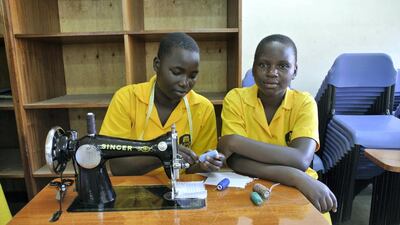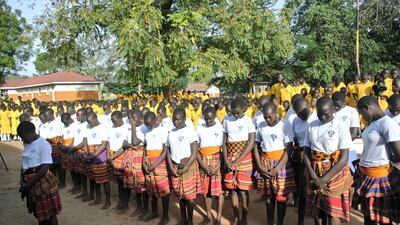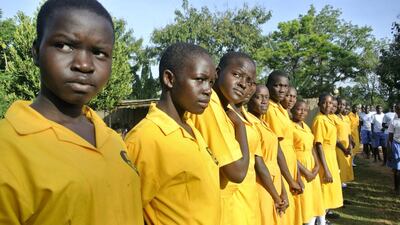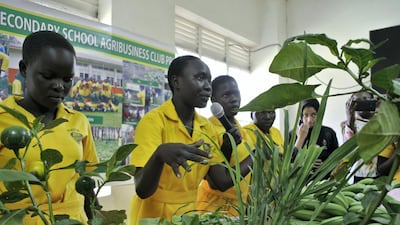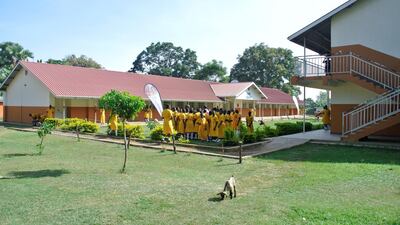A peculiar scene played out on the lush green lawn of St Katherine Secondary School for Girls recently. Dozens of pupils in bright yellow school uniforms and knee-high white socks gathered around a small bleating goat as their teacher held the animal down to demonstrate a live circumcision.
"Awn!" the girls said at once as the procedure was swiftly carried out by agriculture teacher Tom Richard Oluma.
Animal circumcision is one of many hands-on, practical lessons the girls at the Ugandan public school learn as part of their science, technology, engineering and mathematics (stem) curriculum.
The surgery helps to accelerate the animal’s growth and improves the quality of its meat, said Mr Oluma.
_______________
Read more:
Limited support for disabled children in northern Uganda leaves many without education
Refugees in Uganda to benefit from Dubai-funded schools but issues remain at crowded settlement
_______________
Most of the 1,057 pupils studying at the school come from humble families who survive on subsistence farming, so it is important to teach them these practical, real-world skills, said head teacher Rose Nangwala. Pupils learn how to care for the animals, which now include cows, rabbits and chickens; how to breed them and even how to slaughter and prepare the meat.
“We are empowering them to build skills to make some money,” said Ms Nangwala.
St Katherine Secondary School is one of 40 schools in 39 districts across Uganda to share in a US$1,188,280 (Dh4,364,552) donation from Dubai Cares aimed at promoting girls’ participation in stem subjects. In all, about 6,000 pupils, 500 science teachers and 40 head teachers will directly benefit from the funding, which is being managed and distributed by the Forum for African Women Educationalists — Uganda Chapter through 2019.
“There is this perception that sciences are for boys, not a girls’ thing,” said Sarah Murungi, Stem programme officer, for FAWE. “So we are trying to demystify that perception. We want them to come out and take up sciences.”
The funding will cover the cost of materials such as laboratory equipment, chemical reagents, science textbooks to encourage the pupils to develop science projects, start stem clubs and compete in regional and national stem competitions. Training is also offered for teachers.
During a recent visit by Dubai Cares officials to St Katherine Secondary School, the pupils displayed their various science projects. The pupils’ experiments ranged from decorative baked cakes, to recipes for organic pesticides, to using pedal power to recharge mobile phones.
“The methodology of the teaching has moved from the teacher-centred method of teaching to the learner-centred,” said Ms Nangwala. “The students are doing the work themselves. Initially, the teacher knew it all, and the teacher would be standing here and teaching and the students would just listen and take notes. But as I talk, the teachers are also learning from the students. There is more participation among the girls in science subjects.”
Still, many challenges remain for the rural school. A new computer lab built with financial assistance from the African Development Bank in 2015 contains 60 computers to be shared among more than 1,000 pupils. The lab has no internet connection, and the teachers have yet to be trained on how to properly use the new technology.
“We have inadequate computers for the students and the staff,” said Ms Nangwalla. “We have inadequate knowledge of ICT for some of the teaching staff. Some of us are not yet computer literate. Another challenge is lack of internet connectivity in the administration block and the ICT laboratory.”
Ms Murungi, of FAWE, said the Dubai Cares stem project will nonetheless help “uplift” the pupils’ performance in science subjects.
Ms Nangwala agreed, saying the Dubai Cares project has motivated the pupils to get excited about stem.
“The programme has first and foremost empowered the girls,” said Ms Nangwala. “These girls have now built their self-esteem because of the stem competitions. When you go out there and you compete with other students, you come back not the same. There is a lot that is being learnt.”

